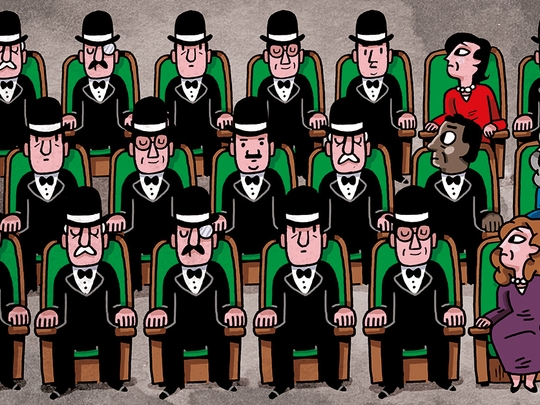
Though many of us agreed with Brenda from Bristol about this general election (“You’re joking. Not another one”), it actually offers a great opportunity for change — regardless of which party wins.
That’s because now the snap election has been called, the normal rules for selecting party candidates no longer apply. Under these rules, constituency parties select a long list of candidates, then a shortlist; then local party members vote for their preferred candidate.
But with a snap election the central offices of the main political parties will themselves choose candidates — including for the many winnable seats where their own MPs are standing down. Which means that all the political parties have a golden opportunity to address the lack of diversity in parliament.
Among our MPs, elected by the people for the people, there are only 191 women — 29 per cent — nearly 150 women short of equal representation.
In 2015 only 41 black and minority ethnic MPs — 6 per cent — were elected, when there should be nearer 100 for a more equitable representation.
I hardly need to argue why representative democracy is vitally important. We know it’s morally right, but often forget that the greatest argument for a government to look like the people it seeks to serve — and that includes class and disability too — is that it gives us a better chance of effective and dynamic government. If you’re making big decisions about people’s lives, it’s better to have a variety of people, backgrounds and experience around the table.
No one’s suggesting a man cannot speak on gender equality issues — they could and they should. But most of the time? I don’t think so. Equally, not every black or minority ethnic MP wants to speak about race equality: they may be more inclined to talk about the environment or health. But there are others who do, and the issues affecting, for example, young black workers have to be dealt with.
The other bonus, of course, is that if the parties seize this opportunity to better reflect the nation’s diversity, it will tell an often cynical public that they are listening to all the nation’s voices.
I travel the country giving talks about democracy, and I hear from a huge number of people, particularly ethnic minorities and the young, who are completely switched off from a parliament they see as remote and unrepresentative. My standard reply is: “That’s precisely why we should engage to force change.”
And I’m saying the same thing now, because this election gives us the attention of party leaders who need our votes.
Critical difference
Yes, the polls say Theresa May should win, but they’ve been wrong so many times recently that nothing can be taken for granted.
If the Conservatives want a clear Brexit mandate, that would mean holding on to seats such as Croydon Central, Derby North, Bury North, Thurrock, Brighton Kempton, and winning marginal seats such as Ealing Central, Wirral West, Halifax, and Brentford and Isleworth. Sizeable minority-ethnic communities could make a critical difference in all these constituencies.
There are already murmurings that potential African-Caribbean candidates are being squeezed out by powerful blocs within the Labour Party. Reports suggest that deals being done between union bosses and the Labour hierarchy massively favour white candidates, even in areas with large black populations such as Lewisham in south London. This is deeply troubling. Further, in the whole of the Midlands there isn’t a single African-Caribbean MP.
There’s a worry too with how the Conservatives might be confronting this, given that Zac Goldsmith was selected as their candidate for the Richmond Park seat over two black women.
In truth, all party leaders would be wise to recognise that their own political objectives could succeed with greater minority representation, or fail without it.
The same applies to the broader issue of each party having a comprehensive strategy for race equality — to close persistent inequality gaps in areas such as black youth unemployment, which is double the national average, and even black graduates are twice as likely to be jobless as their white counterparts.
Every political leader should want to give all citizens a greater sense of belonging. In the struggle towards equality of opportunity, having a dynamic, diverse and representative parliament should be the goal for every political party. They all now have the chance to make a huge step in this direction.
— Guardian News & Media Ltd
Simon Woolley is the director and one of the founders of Operation Black Vote and a commissioner for race on the Equality and Human Rights Commission.










